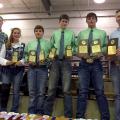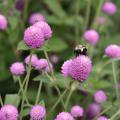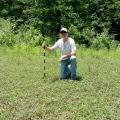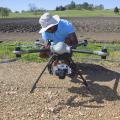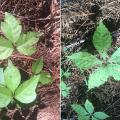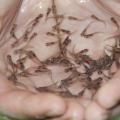News From 2016
When the summer season heats up starting in July, I really like seeing Rudbeckias in our Mississippi landscapes. Who can argue how the brightly colored flowers bring needed freshness when some of our other flowering plants may be showing wear and tear?
STARKVILLE, Miss. -- Parents who want to buy first-rate, back-to-school computers for their children on a midrange budget may want to keep their heads in “the cloud.”
Roberto Gallardo, an associate Extension professor with the Mississippi State University Extension Center for Technology Outreach, said speed and Wi-Fi capabilities should take priority over hard drive space, as more computer manufacturers are shifting to cloud-based computing, which relies on the internet for much of its digital storage capacity.
STARKVILLE, Miss. -- Favorable weather and a steady consumer appetite for local produce are keeping Mississippi’s truck crop industry strong.
The state now has more than 80 farmers markets, compared to 52 in 2010. These markets make up the main avenue through which truck crop growers sell their goods, but local produce can be found with more frequency on grocery store shelves during the growing season. This trend reflects the shift in consumer preference.
By Vanessa Beeson
College of Agriculture and Life Sciences
STARKVILLE, Miss. -- Teams that want to win big in 4-H and FFA livestock judging competitions should attend the Mississippi State University Livestock Judging Camp.
The three-day camp in the MSU College of Agriculture and Life Sciences is open to teams and individuals who are 14 to 18 years of age. Past attendees have included top winners in Mississippi, Alabama and Tennessee livestock judging competitions.
NATCHEZ, Miss. -- Life in a rural community does not guarantee opportunities to experience agriculture, understand where food comes from or learn how to treat animals.
The Adams County Farm Camp offered 35 children, ages 8 to 13, hands-on activities around cattle, chickens, horses, fish, wildlife and gardens.
STARKVILLE, Miss. – The “going green” movement is evidence that people and businesses are becoming increasingly concerned about the environment.
The development of products that are energy efficient and eco-friendly also shows that people want to protect the earth and its precious resources.
By Michaela Parker
MSU Extension Service
ARTESIA, Miss. -- Children’s faces lit up as they watched their bright-blue robots glide across the floor at their commands.
Nate Peterson, community development coordinator for Artesia, watched his 32 summer campers beam with excitement as they played with robots for the first time. Peterson worked alongside camp director Betty Sanders to coordinate sports, educational demonstrations and other activities for local children to enjoy while their parents were at work.
If you’re looking for a tough plant that will tolerate the combination of summer heat and humidity and keep right on blooming, take a look at gomphrena.
STARKVILLE, Miss. -- Summer vacation gives children a break from school, but that does not mean they should stop learning or that summer has to be boring.
RAND Corporation researchers found elementary school students’ academic performance falls by about a month during the summer.
But continued learning does not mean math worksheets, vocabulary lists and tests. Summer is a great time for children to discover learning is fun and can happen anywhere.
STARKVILLE, Miss. -- Reduced acreage, average yields and low prices have added up to another tough year for Mississippi wheat farmers.
The state’s wheat appears to be on track for a third consecutive year in which the value of production was cut in half from the previous year.
Mississippi State University Extension Service agricultural economist Brian Williams said wheat production values were $154.5 million in 2013, $71.7 million in 2014 and $31.5 million in 2015.
STARKVILLE, Miss. -- When planting wildlife food plots, which is better: annuals or perennials? Ideally, you should have different plots designated for both cool- and warm-season annuals, as well as perennials.
STARKVILLE, Miss. -- Part of understanding any emerging technology is clearing up common misunderstandings about it.
About a year ago, the Mississippi State University Extension Service began developing a new program known as Unmanned Aircraft Systems for Decision Agriculture and Environmental Management. The program is designed to educate anyone who might use unmanned aircraft systems, or UAS, professionally or recreationally.
STARKVILLE, Miss. -- Professional turfgrass managers can learn about innovations in turfgrass and landscape management strategy during the 2016 Turfgrass Research Field Day Aug. 23.
By Michaela Parker
MSU Extension Service
STARKVILLE, Miss. -- With only one doctor available in her hometown of Durant, Jhade Jordan understands the importance of practicing medicine in rural areas.
Jordan is a member of the class of 2016 Rural Medical Scholars program. High school seniors from across Mississippi spent June on the Mississippi State University campus to learn more about becoming a family medicine physician. Through this program, supported by the MSU Extension Service, she learned what it means to be a doctor.
RAYMOND, Miss. -- New regulations passed by the U.S. Food and Drug Administration will continue to help cattle producers and veterinarians protect the health of animals and humans.
The amended rules will require all cattle producers to obtain a veterinary feed directive, or VFD, from a licensed veterinarian to use feeds that contain medications. Antimicrobials used in drinking water also require this veterinary prescription.
Gardeners are always looking for landscape plants that provide interest, and they primarily concentrate on the colorful flowers. But in my experience, even the most floriferous garden plant will need some help to maintain garden beauty.
This is where foliage plants come to save the day, and coleus is usually the first choice. But Artemisia is an alternative landscape plant that doesn’t get enough attention.
ROLLING FORK, Miss. -- Mindy Rutherford devotes her days to the family’s expanding Rolling Fork farm.
A former teacher, she left the classroom 11 years ago to focus full time on the row crop farm’s administrative duties and to help manage the first beef cattle herd she and her husband, Bill, bought. They are continuing a legacy begun by Bill Rutherford’s father in 1971.
“I always heard that if you are passionate about what you do, you never work a day in your life. It’s true, and that’s how I feel about the farm,” Mindy Rutherford said.
RAYMOND, Miss. -- Outdoor activities in the spring and summer increase the risk of exposure to poison ivy, but the plants’ danger does not disappear when frost arrives.
Thriving on Mississippi’s hot, humid climate, poison ivy is very common across the state and causes discomfort for 80 to 85 percent of the population. The additional bad news is that allergic reactions from exposure to any part of the plants, including roots, also can occur during the winter from dormant plants.
STONEVILLE, Miss. -- As demand for catfish remains high, the only components of its production trending down this year in Mississippi are pond acreage and the price of feed.
Producers are receiving an average of $1.12 to $1.21 per pound of catfish and paying less than $380 for a ton of feed. To Jimmy Avery, Extension aquaculture professor at the Mississippi State University Delta Research and Extension Center in Stoneville, those data are good news for the bottom line.
Pages
News Types
- Crop Report (424)
- Feature Story (5879)
- Feature Photo (53)
- Extension Outdoors (318)
- Southern Gardening (1452)
- Extension Inbox (95)
Archive
- 2024 (189)
- 2023 (182)
- 2022 (187)
- 2021 (177)
- 2020 (212)
- 2019 (223)
- 2018 (276)
- 2017 (338)
- 2016 (383)
- 2015 (457)
- 2014 (498)
- 2013 (490)
- 2012 (492)
- 2011 (356)
- 2010 (323)
- 2009 (313)
- 2008 (273)
- 2007 (263)
- 2006 (252)
- 2005 (278)
- 2004 (273)
- 2003 (279)
- 2002 (228)
- 2001 (238)
- 2000 (243)
- 1999 (233)
- 1998 (232)
- 1997 (239)
- 1996 (58)
- 1995 (36)



